- Home
- Michael Northrop
Plunked Page 2
Plunked Read online
Page 2
It turns out not to matter at all. Once the frenzy dies down, they make us put it all back. It’s a major bummer. I’d gotten a good bat and a bad helmet, but that’s still batting .500. The coaches have a point, though. Only two of us can bat at the same time, unless we want to hit in the SLOW cage like someone’s grandma. So, basically, we can all take turns using the best equipment.
It makes sense, but I still grumble a little when I hand over my bat. I’d already named it Excalibur, which was King Arthur’s sword and is pretty much what I always name my bats.
Anyway, we form a line alphabetically to wait for our turn. That’s no prize for me: Mogens. More than half the team is ahead of me. Katie Bowe is right up front again. That’s kind of good, because she makes me less nervous from a distance. She’s in game mode, anyway, with her Braves cap pulled down low.
As Dad would say, you can’t pick your neighbors, and Malfoy is right in front of me. That isn’t his real name. His real name is Kurt Meacham, and his dad is Sam Meacham, the other assistant coach. Some of us just call him Malfoy because he looks like the blond kid from the Harry Potter movies. Also, he is a huge jerk-butt. You can’t say that, though, because it could get back to his dad. Assistant Coach Meacham is an even bigger jerk-butt. It must be a family tradition.
There isn’t much talking in the line. Andy is back in the Rs, too far away to talk to. We mostly just watch kids take their hacks. If anyone says anything in line, it’s: “You smoked it!” or “Doink!” or whatever seems appropriate.
The pitching machine is protected by a net, but Dustin Cuddy manages to hit one right back through the square opening where the balls come out.
“Laser-guided!” yells Jackson.
The machine takes it on the nose. It makes a sound like kull-CHIK and does a weird little shudder.
“Everybody get down,” yells Chester. “It’s gonna blow!”
We all laugh, but a few seconds later, the machine lobs the next pitch out as usual. Dustin pops it up, and it’s back to business.
I pay extra attention when Geoff Kass comes up. He’s my main competition in left. There isn’t much difference in our defense. I’m just being totally honest there. Straight up: We’re about the same in the field. We’re both pretty good. You know, steady, with the chance to make a really good play every now and then, maybe dive or whatever.
Our bats are going to make the difference. Last year, Geoff was a really good slap hitter. You know, he just made good contact and legged out a lot of singles. But he’s grown some, and he’s showing more power this season. That’s good news for the team, but not for me.
Anyway, he’s up now. You can’t really tell how far a ball would go in a batting cage, since it just hits the net like anything else. But you can see when it’s hit hard, and more than that, you can hear it. We can all hear it now.
Chester Jiménez is in the other cage. He’s our best bunter, but his big thing is that he’s so small, like super small. He draws a lot of walks because it’s hard for pitchers to throw anything between the letters and knees on a guy that size. I’ve tried. It’s like trying to drop a pebble into a water glass from 2,000 feet up. Chester knows it, too. He’ll scrunch himself up as small as he can at the plate. He’s doing it now, even though nobody ever got a walk in a batting cage.
Anyway, the point is, Chester is hitting grounders and soft liners. The sound is just pop, pop, pop, and there is no mistaking that for the deep, hard thuds coming from the cage next to him. Geoff is laying into ’em, the way you can in a batting cage, with no one on the mound trying to outthink you. A slow roller comes in, and THUD! He sends it the other way. Another one, straight and a little low; a third, higher with a little bend to it … It doesn’t matter: THUD! THUD! THUD!
I can feel my palms starting to sweat a little as I watch. Pretty soon, Chester and Geoff have taken their fifteen swings. They push the cage doors open and take off their helmets, and I move up two more spots.
I’m almost there, and then I am. I adjust my helmet, take the token from Coach, and step into the cage.
Grip it and rip it.
That’s what I tell myself as I work the palms of my batting gloves across the worn black tape on the handle of the bat.
I press my left foot into the asphalt and twist it back and forth in time with my gloves. The red light on top of the pitching machine blinks on like the glowing eye of a Terminator bent on my destruction. Just like always, I start to take my four mini swings, but the first pitch comes out before I’m done.
That’s the thing about pitching machines: No manners.
I rush the bat back, pick my left foot up, and step into it. I drill it, a screamer into the netting, just left of center.
That’s the other thing about pitching machines: You can hit them a ton! I could hear the solid contact when Geoff was up, but now that it’s my turn, I can feel it, too. The energy shoots from my hands right down into the ground, like electricity, but it doesn’t hurt. It feels great.
I watch another dirt-smeared ball roll down and disappear into the machine. There’s a little fa-chunk sound and out it comes, a little higher and straighter than the last one. I drill that one, too, but I chop a grounder on the third pitch.
They aren’t real baseballs. They can’t be, with the pounding they take. They’re hard rubber with dozens of little dimples on them, like oversize, soft golf balls. The machine throws them harder or softer; sometimes they’ll dip and sometimes not so much. The pitching machine is kind of a clunky thing, just a paddle that flips the ball out at you. That’s why it’s good: Every pitch is different, just like in a game.
Except that every pitch is more or less over the plate, something like a strike. The balls never really cut in on you too much. Even if they do, they’re just hard rubber traveling medium speed. And so you can just step in and drill them. The worst thing that could happen to you is that you could swing and miss.
I do that on pitch number seven. I’ve hit a few scorchers in a row, and I think I just get overaggressive. That gets the mouths moving.
“Whiff!” someone yells. It’s sort of distracting because you can’t help but try to place the voices.
“No batta!” shouts someone else. It takes a half second but I realize it’s Jackson, just kidding around.
“If you’re looking for the ball,” yells Manny, our center fielder, “it’s a foot under your bat!”
Yeah, ha-ha-ha. I know they’re just kidding, but then Malfoy chimes in. “You suck!” he yells. “Looo-ser!”
I didn’t say anything when he swung and missed, like, a minute ago. But if there’s a line, Malfoy will cross it. And of course he’s not going to get in trouble with his dad right there.
I guess I let it get under my skin because I barely make contact on the next one and chop it into the ground. I flick my head back quickly to see if the coaches are watching. If they are, it’s not that closely.
They’re talking and looking up now and then. You aren’t really going to impress the coaches by hitting the meatballs this thing is serving up. Plus, eight or nine kids have gone already. The coaches seem pretty well zoned out at this point, maybe just listening for that solid contact they like.
The cages are more for us, just to get our swings down and work on anything we think we need to work on.
Fa-chunk!
The next pitch is on its way and I cannot — repeat: cannot — have a third bad swing in a row. I squint down hard and concentrate on the greasy rubber orbazoid coming at me. I drill it high and hard into the net. The next one, too.
And then my fifteen pitches are up. The red eye of the machine blinks out. I hold the wire-mesh door open for the next kid. I go to put my helmet and bat away, and Andy is there, pretending to push through the racks.
“Good cuts,” he says, and then cracks a smile. “For the most part!”
“Not my fault,” I say. “That pitcher’s pretty crafty.”
“Looks to me like his arm is getting tired.”
“Then you might have a chance,” I tell him.
He pretends to hit me with the bat he’s pretending to try out.
I put mine back in the rack. As Andy and I are walking away, one of the younger kids picks my bat right back out. He takes a few slow swings with it, testing the balance. That’s a compliment, too.
I look around. Geoff is watching me, seeing which bat I used, seeing the kid pick it up. He turns away quick, but I don’t mind. I’ve been watching him, too.
We’re still eating the ice cream bars that Coach bought us when our parents start to arrive. He bought them with the money he saved on the tokens. It’s late March, and it’s not like it’s actually hot. It’s just a nice, early spring day, and we have free ice cream, and it’s like, who says being an athlete is hard work?
I lick the wooden stick clean and chuck it in the garbage can when I see Mom’s car pull up. The Green Machine, we call it. It’s pretty ugly: a stubby old Honda, and a weird shade of green. It’s the kind of car people use to go to the train station and back, a “station car.” Except that Mom doesn’t use it for that, since she works in town. She just beats around Tall Pines in it. She isn’t driving today, though. As I walk across the lot, I can see Mom in the passenger seat. Dad is driving. He kind of likes the Green Machine, too.
I climb into the tiny backseat and close the door behind me. Dad starts the car and looks over his shoulder: “How’d it go?”
I really hope he won’t try to make eye contact the whole way from up there.
Mom looks back, waiting for my reply and scanning me for any signs of injury. I just smile because no one ever gets hurt in a batting cage. No one except the balls, anyway.
“OK,” I say.
“Is that Siobhan over there?” Mom asks, meaning Andy’s mom.
It is, but we’ve already pulled out of the lot. We’re on our way back to town.
“Work up an appetite?” asks Dad.
“Sure!” I say. I don’t tell them about the ice cream.
We decide to go to the deli counter at the supermarket because they make the best sandwiches. Mom gets a Veggie Deluxe. As near as I can tell, it’s a salad between two slices of chunky brown bread. So weird.
When we pull into our driveway, I can hear Nax going crazy even before the car comes to a stop.
“Someone needs to be walked,” says Mom.
Nax is barking up a storm in the kitchen. His paws are on the glass of the door, and his eyes are wild with excitement as I cross the lawn. I’ve only been gone a few hours, but Nax can’t tell time. He’s a black Lab, nothing fancy. Sometimes when he’s being crazy we call him “the Lab experiment.”
Nax and I go for a walk on the Rail Trail that runs along the train tracks near our house. As long as he doesn’t do his business right on the pavement, I don’t really need to pick up after him back there. When he was little, I used to have to drag him off to the side when he started squatting, but he mostly knows the deal by now. Sometimes he even pulls me off to the side, stretching to the end of his leash and contributing some quality fertilizer to the grass and flowers and weeds along the side of the path.
Nax is a smart dog. I mean, they say Labs are smart, in general, but I think he might be a little smarter than normal. The only reason I even use the leash anymore is because of the squirrels. He goes crazy trying to chase them. If he was an athlete, that would be his sport: the squirrelathlon. He loves it. Sometimes I’ll try to run along with him, just so he can chase them for more than four feet at a time. He’s never going to catch one, but he either doesn’t know that or doesn’t care.
“Good dog,” I say as he finishes his business. He comes up, and I scratch him behind the ear, just where he likes it.
We turn around at the little pond. It used to be just a big puddle, but it has grown up just like Nax has. We have to get back because there’s homework waiting. Not for Nax, of course — he’s not that smart! — but for me. They’ll probably make me mow the lawn, too. It’s the kind of stuff you want to fast-forward past, but you can’t. This whole week is going to be like that, waiting to find out on Thursday if I’m a starter.
“Fun while it lasted,” I say to Nax. Ten feet later, we take off after a squirrel.
Monday mornings always suck. It’s sort of a law of nature. Or a law of human nature, anyway. It’s not like beavers send their kids off to some little beaver hut to learn how to build dams. That’s kind of a dumb thought, but that’s the kind I have when I’m lying there avoiding getting out of bed.
It’s not like I completely hate school, but I’ll be honest: I kind of hate it on Mondays. There’s never anything I can do about it, though. I have the kind of alarm clock the whole house can hear. I think, in the town of Tall Pines, it ranks third in noise to the clock tower on the Congregational Church and the alarm horn at the Tall Pines Volunteer Fire Department.
The alarm goes off: BRREEEEP! BRREEEEP! BRREEEEP!
I scramble to slap the button on top. Then I throw the sheets off and get up.
I go through the same routine as always: clean up, get dressed, cereal, bus stop, bus ride, school.
I’m still sort of blinking myself awake in first period, history. History class is ridiculous even on non-Mondays. It’s like the whole nation is terrified that there is some child somewhere who doesn’t know about the Louisiana Purchase.
Second period is English, and at least I’m fully awake for that. We’re reading The Island of Dr. Moreau by H. G. Wells. It’s one of those really old books. I’d heard the name H. G. Wells before, but I hadn’t realized he was a real person until the book plopped down on my desk. I thought he was like Sherlock Holmes or something.
The book is actually pretty cool. First of all, it’s short, and those are the best kind of books. Second, it’s about this crazy doctor (guess what his name is! Ha-ha!). He’s creating half animal, half human creatures on this island, like a half pig or a half wolf or whatever. It’s kind of a cool concept.
On the team, one of the best things you can call someone is a beast. “You’re a beast, man!” Like if J.P., who’s our best pitcher, strikes out ten guys, you’d say that.
Anyway, we’re most of the way through the book. Like I said, it’s short. There are no assigned seats in English because Mr. Haun doesn’t “believe in them.” But Andy and I usually get there early enough to sit across the aisle from each other. Sometimes we sit one in front of the other in the same aisle, but that’s not as good, because one of us has to turn around to talk.
Anyway, today we’re across from each other, like two-thirds of the way back. Perfect location. The bell hasn’t gone off yet, and we’re talking about what sort of half human, half animal we’d be.
“I’d be, like, I’d be…” says Andy.
He’s taking too long, so I start in: “Donkey! Skunk! Monkey-butt!”
“Shut up!” he says. “I think I’d be a jaguar.”
“Yeah, right!” I say.
“No, seriously, think about it.”
“I am. That’s why I said ‘yeah, right.’”
“Seriously, I’m kind of small but pretty fast.”
“I think that’s cheetahs,” I say.
“I’m not that fast,” says Andy, and then the bell rings.
“Half tiger!” I say quickly, in that second when everyone is opening up their notebook and straightening out in their seat.
Andy rolls his eyes, but tigers are tougher than jaguars, and it’s too late for him to change his pick. Mr. Haun is already talking.
Andy and I don’t have all of the same classes, but we always meet up at lunch. Whoever gets to the caf first saves a seat. By the time I navigate my tray of Mexican Surprise through the rows, I can see that Andy is already sitting down and eating. He really is fast. Maybe not jaguar fast, but still. Tim Liu is across from him, and I slide my tray into the reserved parking spot next to him.
“What are you losers talking about?” I say.
The answer is baseball, of course. Most of the time i
t’s about our team, but sometimes it’s the big leagues. Opening day is coming up, so it’s on our minds. (It’s not like it wouldn’t be on our minds after opening day, but you know how it is. April baseball is kind of low stakes in the majors.)
Jackson wore a Yankees hat into school this morning, and so we’re talking about whether or not the Yankees are evil. I guess it would be more accurate to say we’re talking about how evil the Yankees are and whether or not that makes Jackson evil, too.
“Their payroll is like a billion dollars,” Tim says.
“No way,” I say. “It’s like two hundred–some million.”
“Yuh-huh,” says Tim. “I mean total, long-range. They’ve got those big guys on like five- and ten-year contracts at ten or twenty million a pop.”
Those are what you call ballpark figures. I mean, there’s a pretty big difference between five and ten years and ten million and twenty million dollars. The thing is, though, he’s sort of right.
“And Kansas City pays like forty million bucks for the whole team,” he adds.
I think that might be a little low, but again, ballpark.
“Evil,” says Andy.
“Evil,” Tim and I agree.
There’s a little pause.
“The Sox are, like —” I say.
“Like two-thirds of the Yankees,” says Tim.
If you just say the Sox, you mean the Red Sox. If you mean the White Sox, you have to say so. That’s just the way the world works.
And then Chester plunks his tray down on the table.
“Hello, losers,” he says. We use that word a lot. It’s OK to call someone a loser if he’s your friend. I don’t know if that’s the way the world works, too, or if it’s just sixth grade.
Anyway, we start to bust on him about the Mexican Surprise. That probably isn’t cool of us, but it doesn’t matter.
“My parents are from Ecuador,” says Chester. “Don’t be so ignorant.”

 On Thin Ice
On Thin Ice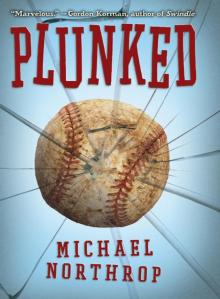 Plunked
Plunked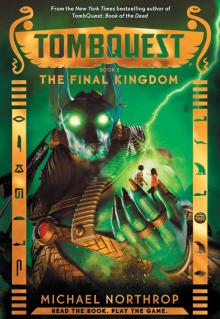 The Final Kingdom
The Final Kingdom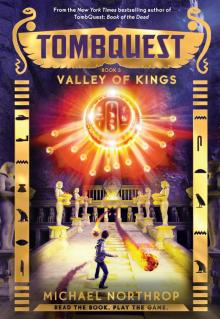 Valley of Kings
Valley of Kings Surrounded by Sharks
Surrounded by Sharks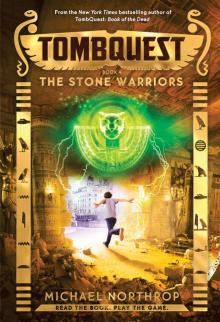 The Stone Warriors
The Stone Warriors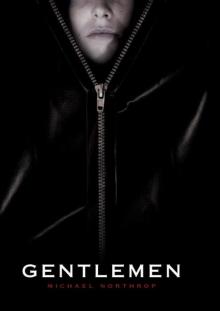 Gentlemen
Gentlemen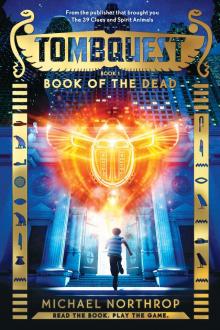 Book of the Dead
Book of the Dead Polaris
Polaris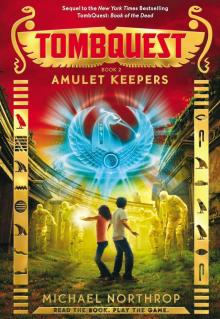 Amulet Keepers
Amulet Keepers